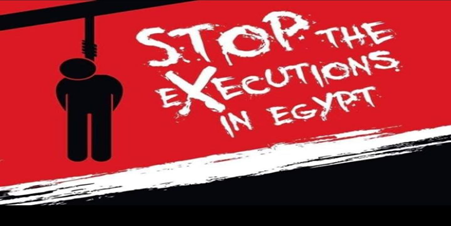
Calls escalating upon Egyptian government to stop politically motivated executions in the country
The Adalah Center for Rights and Freedoms has launched a human campaign calling on the Egyptian authorities to halt the issuance and implementation of executions of those held on political grounds.
The rights group said the death sentences recently issued and the executions that preceded them have been handed out as a form of “political revenge”, and as a result of trying to achieve justice through fair trials.
“The death penalty in Egypt has become the manipulative regime’s way of responding to all political opponents,” it said.
“Everyone who had followed the trials that led to executions in Egypt described them as trials that lacked the minimum standards and guarantees of fair trials, and all concerned international bodies condemned the judicial practices that took place in those trials,” it added.
It stressed that “the right to life is an inherent right of every person and not a gift or favor from regimes and governments.”
El Shehab rights seminar
In the same context, El Shehab for Human Rights on Tuesday, 26 April 2022 organized a human rights seminar, titled, “Stop Executions in Egypt”.
The seminar was attended by the French lawyer Mr. Gilles Devres and a number of international human rights organizations, to address the “Political executions in Egypt, between achievement of justice and political revenge”.
Then twelve human rights organizations, including: El-Shehab for Human Rights, London; Adalah for Human Rights, Istanbul, International Peace for the Protection of Human Rights, London; and the Association for the Prevention of Torture (APT), Geneva., have signed a joint statement calling for a moratorium on executions in Egypt.
The statement stressed that “The Stop the Execution campaign confirms that the death sentences recently issued in Egypt, the executions implemented against 105 political detainees, and the likely implementation at any time of 95 others given final death sentences in 18 political cases – is only a kind of “political revenge” that is far from achievement of justice after fair trials based on rights guarantees and justice principles…”.
The demands made by human rights organizations included:
– A moratorium of executions, and reviewing punishment and trials in a manner consistent with the constitution and international covenants.
– Ratification by the Egyptian government of the Second Optional Protocol to the International Covenant on Civil and Political Rights, regarding the abolition of the death penalty.
– The Egyptian government’s adherence to Article 6 of the International Covenant on Civil and Political Rights, especially the second paragraph which states that this punishment would be imposed exclusively for extremely serious crimes according to a competent court and a natural judge and by fair trial procedures that abide by international covenants.
– Activation of the first resolution of the United Nations General Assembly in 2007, which calls for imposition of a voluntary moratorium on implementation of the death penalty, and starting a broad societal debate, both official and popular, about the death penalty and its feasibility, and considering replacing it with other penalties.
– Reconsidering recommendations of experts of the United Nations and the African Commission on Human and Peoples’ Rights, regarding death sentences in Egypt.
Politicized executions widen societal injustice
“Executions, particularly in cases of alleged political violence, only widen the sense of societal injustice. Egypt has been moving fast to execute detainees, with Abdel Fattah al-Sisi himself apparently backing this terrible spike in death sentences in Egypt,” says Amr Magdi, a Middle East and North Africa Researcher at Human Rights Watch.
“Once, Sisi lectured his critics, including European leaders, at the Arab-EU summit in Sharm el-Sheikh, suggesting that executing detainees is part of “our humanity”, which is different from “your [European] humanity,” Magdi says in an article on Middle East Eye.
Yet when speaking about values, Sisi’s justification speaks little truth, and aims to conceal an unprecedented crisis in Egypt’s recent history. Under Sisi, Egypt’s use of the death penalty has soared, with thousands of death sentences ordered since 2013.
This escalation is actually a break from past practices observed even under former President Hosni Mubarak’s 30-year authoritarian rule, of commuting or halting some death sentences, and even under former President Anwar Sadat whose assassins were never executed.
This surge should bring significant scrutiny, but Sisi’s government has worked to quash any free dialogue about the death penalty, while working in tandem to silence organisations that shed light on human rights abuses.
Since 2014, when Sisi became president, Egypt has been among the 10 countries with the highest numbers of annual executions, joining other notorious executors of the death penalty like China, Iran and Saudi Arabia.
And since 2014, criminal and military courts have issued more than 2,500 initial death sentences, hundreds of them in cases of alleged political violence, which are usually marred with severe due process violations.
In comparison with past practice, an international rights group found that Egyptian criminal courts had issued 530 death sentences between 1991 and 2000, which was also a period of political violence in Egypt.
Right now, there are about 50 people who are at risk of execution at any moment, after their death sentences have been confirmed by military or civilian appeals courts.
As part of his disinformation campaign, Sisi has aimed to portray human rights values as “Western” and “foreign” to Egypt. In fact, many brave Egyptians have for years campaigned against the death penalty, including lawyer Nasser Amin, anthropologist Reem Saad and historian Khaled Fahmy, among others.
Sisi has tried to portray the death penalty as a broadly accepted practice, but in reality, its use has been declining worldwide. According to a 2015 UN report, around 160 countries – including countries in Asia, Africa and Latin America and many Muslim countries- have ended the death penalty in law or in practice.
In 2017, Egypt was among only 23 countries that have carried out executions.
So why have executions been skyrocketing in Egypt? The answer to this question is also central to understanding why they should be halted.
Executions skyrocketing
After the July 2013 military coup that forcibly removed Mohamed Morsi, Egypt’s first democratically elected president, the military-backed government prosecuted thousands of Muslim Brotherhood leaders, members and sympathizers, often in mass trials over alleged political violence.
At that time, the country was still in severe political turmoil and the military rulers had not yet asserted their full control over traditionally independent state institutions. This included the judiciary at that time, where many criminal court judges simply opted to quit overseeing such cases.
In response, in late 2013 the government created special “terrorism courts” within the criminal court system and assigned willing judges to oversee cases of alleged political violence.
This was a big move for the judiciary towards becoming a tool of oppression and a major attack on the judiciary’s independence. These so-called terrorism courts, particularly a handful of judges, issued hundreds of death sentences.
But the Cassation court, Egypt’s highest appellate court, continued to act as a relatively strong check on those flawed convictions by overturning many of them between 2014 and 2016.
As a highly respected court, it was hard for the government to undermine its independence – at least until the assassination of Hisham Barakat, the former prosecutor-general, in June 2015.
At his funeral, Sisi remarked: “The hand of justice is tied by laws… We cannot wait for that.” Furiously critical of the judges present around him for slowing down the implementation of his own vision of “justice”, Sisi pledged to amend the country’s laws; and he kept that promise.
In April 2017, Sisi approved amendments to Egypt’s Criminal Procedural Code and the law concerning appeals in order to circumvent the Court of Cassation – developments that Amnesty International described as a “nail in the coffin of fair trial standards”.
On the same day, Sisi also passed a law that gave him a tighter control over appoint the Cassation Court’s chef judge.
Since then, the Cassation Court’s role in overturning flawed death sentences has been severely diminished, and it has upheld scores of them.
Additionally, and even before Barakat’s assassination, Sisi had issued an unprecedented law in October 2014 that extended the jurisdiction of military courts to prosecute civilians.
Since then, over 15,000 civilians have been referred for military prosecution, leading to scores of additional death sentences by inherently unjust courts.
Additionally, and even before Barakat’s assassination, Sisi had issued an unprecedented law in October 2014 that extended the jurisdiction of military courts to prosecute civilians.
Since then, over 15,000 civilians have been referred for military prosecution, leading to scores of additional death sentences by inherently unjust courts.
This execution spree is also happening in a country whose security forces have killed hundreds of peaceful protesters since 2011 with near-absolute impunity, and have been accused in incidents of extrajudicial executions of detainees as well.
Egyptian justice is not only so often unjust, but it is “malfunctioning”, to the extent that a judge’s signature on a death sentence was found to be forged.
Trials are systematically flawed, with one judge sentencing more than 500 people to death in one case, and another sentencing a four-year-old toddler to life in prison, in what was later called a “mistake”.
There is a serious concern that after several years of rolling back due process protections, and eroding the independence of the judiciary, the floodgates are set to open for a wave of executions conducted after massively unfair trials.
What’s needed is not patiently listening to Sisi’s fact-free lectures about human rights values in Egypt, but rather sustained and public criticism, including by Egypt’s allies, against the government’s apparent desire to carry out more death sentences against victims of a broken and flawed judicial process.



